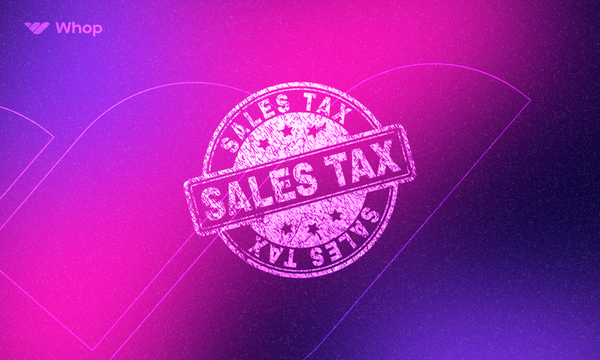Tax can be both complicated and intimidating, but it’s one of the most important aspects of business to get familiar and stay compliant with. Many countries today use VAT, but the U.S. sales tax system is vital to understand if you have digital products and services to sell.
This guide will take you through how U.S. sales tax works and why it’s important, along with how Whop helps you handle sales tax with respect to your business and customers.
Understanding U.S. Sales Tax
Sales tax is a consumption tax levied by state and local governments on the sales of goods and, in some cases, services. The U.S. doesn’t have a national sales tax, so your local jurisdiction matters—your city or county may have just as much authority as your state to impose and regulate its own tax rate.
This also means that these same local jurisdictions can decide what products and services to tax and which ones to exempt. Tangible goods are generally taxable, but certain services and digital products might be subject to sales tax in some states of the U.S. but not others.
The power that local jurisdictions have to tax various products and impose certain rates depends on how much leeway is allowed by the state government itself. In some cases you may find state-wide policies when it comes to tax rate and what’s taxable, but it’s worth checking out the exact rules where you operate or where the majority of your customers are.
U.S. sales tax introduces the concept of “nexus” referring to a sufficient connection between a business and a state, which gives the state the authority to require the business to collect and remit sales tax. This means that if you do a certain amount of business in a certain state, you may have to remit sales tax there.
As a seller, you’re generally responsible for collecting sales tax from your customers and remitting it to the appropriate tax authority. This normally means registering with the state tax agency, filing regular sales tax returns, and submitting the collected tax revenue.
Luckily, Whop acts as a Merchant of Record and can handle a lot of this for you. Nevertheless, staying up to date on sales tax in your area and as pertains to your business is always a good idea.

How Sales Tax Works
Sales tax is relatively simple in a conceptual sense, because it’s simply a percentage that’s tacked on to the price of a product and paid by the end consumer.
In the case of a state sales tax of 5% and no local taxes, for example, a computer store might list a machine for $1000. They’ll collect $1050 from the consumer, keeping the $1000 sale price and remitting the $50 sales tax to the state government.
The nexus concept comes into play when the same computer store starts selling online to consumers from different states. Now, the store has to determine first whether their total sales in these states exceed economic nexus thresholds and then whether computers are subject to sales tax in each of these states.
If both of these boxes are checked, then the store will have to collect and remit sales tax in that state, using each state’s sales tax rate.
U.S. Sales Tax vs. VAT
VAT is regarded by many as a more complicated system than sales tax, but the difference is quite simple. Sales tax is paid wholly by the end consumer, but VAT distributes tax all throughout the supply chain.
You can take a look at our guide to VAT for more, but sales tax heavily favors companies and corporations that make up the supply chain since B2B transactions tend to be exempt from sales tax in most if not all cases.
Whop as a Merchant of Record
Whop serves as a Merchant of Record (MoR) thanks to legislation covering market facilitators, and this has several beneficial implications for you as a seller on Whop. The most important thing is that Whop handles sales tax for you, incurring payment liability for all digital products sold on the Whop marketplace.
If you connect Whop as your Merchant of Record, Whop can take care of all of these operating concerns for you by collecting and remitting sales tax on your behalf, as well as processing refunds and chargebacks. This frees you up to focus on your products and your customers!
If you haven’t connected Whop as your MoR but would like to do so, check out Whop’s MoR documentation here.
What Else Whop Can Do For You
Aside from taking the duties of collecting and remitting sales tax on your behalf off your hands as a Merchant of Record, Whop can help you keep track of your tax compliance in several ways.
One of the most important tools that shouldn’t be overlooked is the Whop business dashboard. This feature allows you to track all of your real-time financial data, letting you check up on your business situation in just a couple of clicks.
Your Whop dashboard also allows you to export all of your payment data across any date range. When tax season comes around or your fiscal year is drawing to a close, your Whop dashboard can save you hours of work. You can even aggregate this data across multiple payment processors such as Stripe, PayPal, Venmo, and even crypto!
Conclusion
U.S. sales tax is a consumption-based tax that’s levied by most states but can also be applied at local jurisdictions depending on where you are. Most physical goods are taxed, but many services and digital products are exempted from sales tax in certain states.
Whop takes care of collecting and remitting sales tax for you as a Merchant of Record. Your Whop business dashboard can also help you out when you need to do any reporting or simply stay up to date on your business’ financial data.
Anyone can create a business and start selling products or services on Whop in minutes. If you’ve got digital products or services to sell, get in touch with the team at Whop for any help or support you require.
👉 Visit Whop.com to get started with just a few clicks!
📚 Read our Sales Tax or Merchant or Record (MoR) documentation to find out more about how we can help you with Sales Tax compliance.




